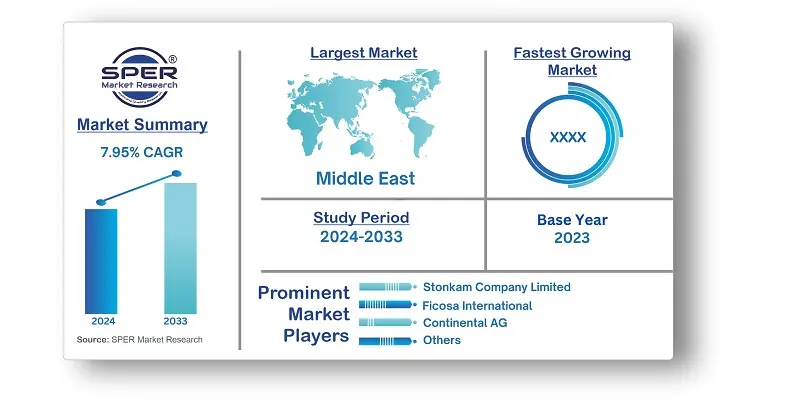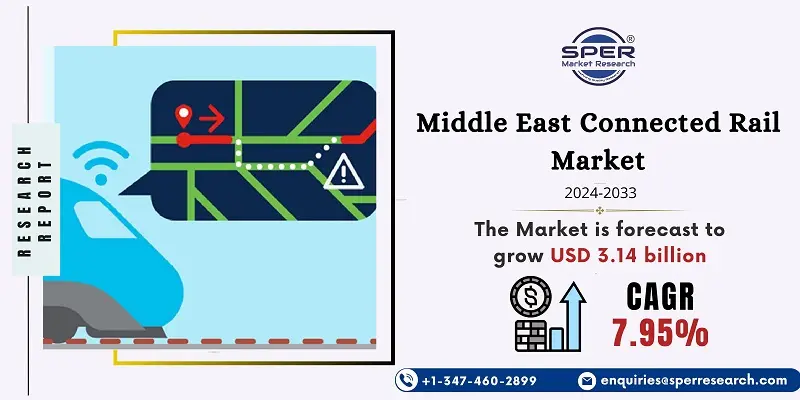
Middle East Connected Rail Market Growth, Size, Trends, Share, Revenue and Future Outlook
Middle East Connected Rail Market Size- By Service, By Rolling Stock, By Safety and Signaling System- Regional Outlook, Competitive Strategies and Segment Forecast to 2033
| Published: Sep-2024 | Report ID: AMIN24206 | Pages: 1 - 156 | Formats*: |
| Category : Automotive & Transportation | |||
- Saudi Arabia Railways (SAR) and Stadler Rail signed an agreement in 2024 to provide and maintain 10+10 Next Generation Passenger Trains, which would assist enhance capacity between Riyadh and Dammam. The new trains will be constructed to match the most recent European and international standards, with a capacity of 320 passengers and specifically engineered to withstand Saudi Arabia's environment. This agreement is an important step towards the Kingdom's Vision 2030 development ambitions, doubling the East Trains' annual capacity to more than 3.8 million passengers.


| Report Metric | Details |
| Market size available for years | 2020-2033 |
| Base year considered | 2023 |
| Forecast period | 2024-2033 |
| Segments covered | By Service, By Rolling Stock, By Safety and Signaling System. |
| Regions covered | Saudi Arabia, UAE, Qatar, Kuwait, Bahrain, Oman |
| Companies Covered | Siemens Mobility, Alstom, Bombardier Transportation, Thales Group, Huawei Technologies, Cisco Systems, Hitachi Rail, ABB, Nokia Corporation, Ansaldo STS. |
- Changes in Passenger Behaviour: The epidemic has caused a shift in passenger behaviour, emphasising the necessity of contactless travel experiences and real-time information offered by connected rail technologies.
- Operational Difficulties: Lockdowns presented operational difficulties for rail operators, underscoring the necessity of flexible and robust interconnected rail systems.
- Accelerated Digital Transformation: By highlighting the importance of linked technology in maintaining operational continuity, the epidemic hastened the digital transformation of train operations.
- Government Agencies
- Railway Operators
- Smart Infrastructure Providers
- Telecommunications Companies
- IT and Software Solution Providers
- Construction and Engineering Firms
- Public Transport Authorities
- Technology Vendors
- Investors and Financial Institutions
- Regulatory Bodies
| By Service: |
|
| By Rolling Stock: |
|
| By Safety and Signaling System: |
|
- Middle East Connected Rail Market Size (FY’2024-FY’2033)
- Overview of Middle East Connected Rail Market
- Segmentation of Middle East Connected Rail Market by Service (Predictive Maintenance, Passenger Information System, Train Tracking and Monitoring, Automated Fare Collection System, Passenger Mobility)
- Segmentation of Middle East Connected Rail Market by Rolling Stock (Freight Wagons, Passenger Wagons, Diesel Locomotive, Electric Locomotive, Light Rail and Trams)
- Segmentation of Middle East Connected Rail Market by Safety and Signaling System (Positive Train Control, Communication Based Train Control, Automated Train Control)
- Statistical Snap of Middle East Connected Rail Market
- Expansion Analysis of Middle East Connected Rail Market
- Problems and Obstacles in Middle East Connected Rail Market
- Competitive Landscape in the Middle East Connected Rail Market
- Impact of COVID-19 and Demonetization on Middle East Connected Rail Market
- Details on Current Investment in Middle East Connected Rail Market
- Competitive Analysis of Middle East Connected Rail Market
- Prominent Players in the Middle East Connected Rail Market
- SWOT Analysis of Middle East Connected Rail Market
- Middle East Connected Rail Market Future Outlook and Projections (FY’2024-FY’2033)
- Recommendations from Analyst
1.1. Scope of the report1.2. Market segment analysis
2.1. Research data source
2.1.1. Secondary Data2.1.2. Primary Data2.1.3. SPER’s internal database2.1.4. Premium insight from KOL’s
2.2. Market size estimation
2.2.1. Top-down and Bottom-up approach
2.3. Data triangulation
4.1. Driver, Restraint, Opportunity and Challenges analysis
4.1.1. Drivers4.1.2. Restraints4.1.3. Opportunities4.1.4. Challenges
4.2. COVID-19 Impacts of the Middle East Connected Rail Market.
5.1. SWOT Analysis
5.1.1. Strengths5.1.2. Weaknesses5.1.3. Opportunities5.1.4. Threats
5.2. PESTEL Analysis
5.2.1. Political Landscape5.2.2. Economic Landscape5.2.3. Social Landscape5.2.4. Technological Landscape5.2.5. Environmental Landscape5.2.6. Legal Landscape
5.3. PORTER’s Five Forces
5.3.1. Bargaining power of suppliers5.3.2. Bargaining power of buyers5.3.3. Threat of Substitute5.3.4. Threat of new entrant5.3.5. Competitive rivalry
5.4. Heat Map Analysis
6.1. Middle East Connected Rail Market Manufacturing Base Distribution, Sales Area, Product Type6.2. Mergers & Acquisitions, Partnerships, Product Launch, and Collaboration in Middle East Connected Rail Market
7.1. Middle East Connected Rail Market Size, Share and Forecast, By Service, 2020-20267.2. Middle East Connected Rail Market Size, Share and Forecast, By Service, 2027-20337.3. Predictive Maintenance7.4. Passenger Information System7.5. Train Tracking and Monitoring7.6. Automated Fare Collection System7.7. Passenger Mobility
8.1. Middle East Connected Rail Market Size, Share and Forecast, By Rolling Stock, 2020-20268.2. Middle East Connected Rail Market Size, Share and Forecast, By Rolling Stock, 2027-20338.3. Freight Wagons8.4. Passenger Wagons8.5. Diesel Locomotive8.6. Electric Locomotive8.7. Light Rail and Trams
9.1. Middle East Connected Rail Market Size, Share and Forecast, By Safety and Signaling System, 2020-20269.2. Middle East Connected Rail Market Size, Share and Forecast, By Safety and Signaling System, 2027-20339.3. Positive Train Control9.4. Communication Based Train Control9.5. Automated Train Control
10.1. Middle East Connected Rail Market Size and Market Share By Region (2020-2026)10.2. Middle East Connected Rail Market Size and Market Share By Region (2027-2033)10.3. Saudi Arabia10.4. UAE10.5. Qatar10.6. Kuwait10.7. Bahrain10.8. Oman
11.1. Siemens Mobility
11.1.1. Company details11.1.2. Financial outlook11.1.3. Product summary11.1.4. Recent developments
11.2. Alstom
11.2.1. Company details11.2.2. Financial outlook11.2.3. Product summary11.2.4. Recent developments
11.3. Bombardier Transportation
11.3.1. Company details11.3.2. Financial outlook11.3.3. Product summary11.3.4. Recent developments
11.4. Thales Group
11.4.1. Company details11.4.2. Financial outlook11.4.3. Product summary11.4.4. Recent developments
11.5. Huawei Technologies
11.5.1. Company details11.5.2. Financial outlook11.5.3. Product summary11.5.4. Recent developments
11.6. Cisco Systems
11.6.1. Company details11.6.2. Financial outlook11.6.3. Product summary11.6.4. Recent developments
11.7. Hitachi Rail
11.7.1. Company details11.7.2. Financial outlook11.7.3. Product summary11.7.4. Recent developments
11.8. ABB
11.8.1. Company details11.8.2. Financial outlook11.8.3. Product summary11.8.4. Recent developments
11.9. Nokia Corporation
11.9.1. Company details11.9.2. Financial outlook11.9.3. Product summary11.9.4. Recent developments
11.10. Ansaldo STS
11.10.1. Company details11.10.2. Financial outlook11.10.3. Product summary11.10.4. Recent developments
11.11. Others
SPER Market Research’s methodology uses great emphasis on primary research to ensure that the market intelligence insights are up to date, reliable and accurate. Primary interviews are done with players involved in each phase of a supply chain to analyze the market forecasting. The secondary research method is used to help you fully understand how the future markets and the spending patterns look likes.
The report is based on in-depth qualitative and quantitative analysis of the Product Market. The quantitative analysis involves the application of various projection and sampling techniques. The qualitative analysis involves primary interviews, surveys, and vendor briefings. The data gathered as a result of these processes are validated through experts opinion. Our research methodology entails an ideal mixture of primary and secondary initiatives.



Frequently Asked Questions About This Report
PLACE AN ORDER
Year End Discount
Sample Report
Pre-Purchase Inquiry
NEED CUSTOMIZATION?
Request CustomizationCALL OR EMAIL US
100% Secure Payment






Related Reports
Our Global Clients
Our data-driven insights have influenced the strategy of 200+ reputed companies across the globe.




















